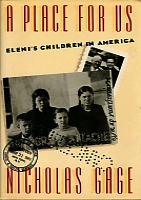Books and Good Reading
Publisher: Houghton Mifflin. ISBN ISBN 0 395 45517-0 . Price: GB Pounds (around €). Source. Publisher. Bookshops. A Place for Us: Eleni’s Children in America: The Review. by Nicholas Gage A Place for Us answers the question that was uppermost in my mind when I finished Eleni: why did Nick Gage never express any criticism of his father’s lack of action – why did he not blame him for leaving the family in Greece to suffer such hardship and loss? But now we learn almost immediately that the young Nikola did in fact harbour tremendous feelings of resentment and blame towards his father, feelings which take many years to dissipate. His relationship with his father during his childhood is awkward at best, and at worst is downright hostile. There are many threads running through the book that readers will be able to identify with – not only the uneasy relationship between rebellious son and traditional father. There is also a huge culture clash. The family was brought up in a very conservative way in a remote mountain village and the girls – Olga, Glykeria, Kanta and Fotini – in particular, find it very hard to adjust to life in ‘50s America. They are unfamiliar with luxuries like cars and indoor sanitation, but neither are they used to the brashness, the easiness between males and females and the pace of life. Living in a Greek community, they are protected to some extent from the worst excesses of American life, but not until all the girls are suitably married off to respectable fellow Greeks does their father relax. Young Nikola (Nick), on the other hand, embraces all that is new and takes to the cinema, school and girls in a big way. Like so many young adolescents, he flirts with criminality and only comes to his senses by remembering that his mother died so that he might have a good life in America. But it takes a scrape which sees him in court to reconcile Nick at last with his father, Christos. To his amazement, Christos speaks up on his behalf rather than condemning him, and suddenly the two of them start to communicate. The family is never well-off, despite the belief in the home village in Greece that Christos was enormously rich. There are hard times financially, even with the brothers-in-law contributing to the joint income. The reality of America is not the dream existence the family imagined. When Nick decides to make a career in journalism and go to college, he has to take part-time work, but once he gets there, he goes from strength to strength, winning prizes, scholarships and awards. One of Nick’s prizes is an award of a thousand dollars, and with this money in his pocket, he decides to make a visit to Lia, his home village. He wants to discover as much as possible about what happened to his mother – he needs to find out who was responsible for her death, not only to come to terms with it in his own mind, but ultimately so that he can track them down and punish them. Only so much is possible in a short visit, and Nick decides to try and guide his career in such a way that one day he will be sent to Greece, where he will have the time to properly investigate his mother’s death. Nick’s career blossoms, and eventually so does his love life. He took almost seven years to make up his mind about Joan, who became his wife in 1970. She was a fellow journalist, but had committed the almost unpardonable sin of being non-Greek. Nick was seriously worried about breaking the news to his father and sisters – he wanted to be certain that his new wife would not upset the relationship he had with his family – but his father approved the match and his sisters grudgingly agreed that Joan was the nicest girl Nick had brought home. So, now all of Eleni’s children are grown and settled. Is that the end of the story? Not at all – Nick and Joan produce two children, Christos and Eleni – and then Nick realises his ambition and is sent by the New York Times to open an Athens bureau. Events in the Middle East take up all his time and prevent him from doing any of his own investigating, so eventually he resigns from the paper and sets out on his mission of discovery. When the now elderly and frail Christos is almost on his deathbed, Nick finishes his book Eleni. He brings a copy of it to his father, and we realise at last why there is no bitterness about Christos in the book. Nick loves his father and would not have wished to hurt him. The relationship is complete – Christos has taken over from Eleni as the beloved parent, and a few weeks later he dies, a happy man, surrounded by his precious family. Although A Place for Us is the sequel to Eleni, it can be read and enjoyed even by those who have not yet made the acquaintance of the Gatzoyiannis family. And for those of us who have become addicts there is good news – Nick and Joan’s daughter Eleni has also written a book, North of Ithaca – in which she returns to the family’s village in northern Greece. I will be reviewing North
of Ithaca later this year. Watch this space! |
